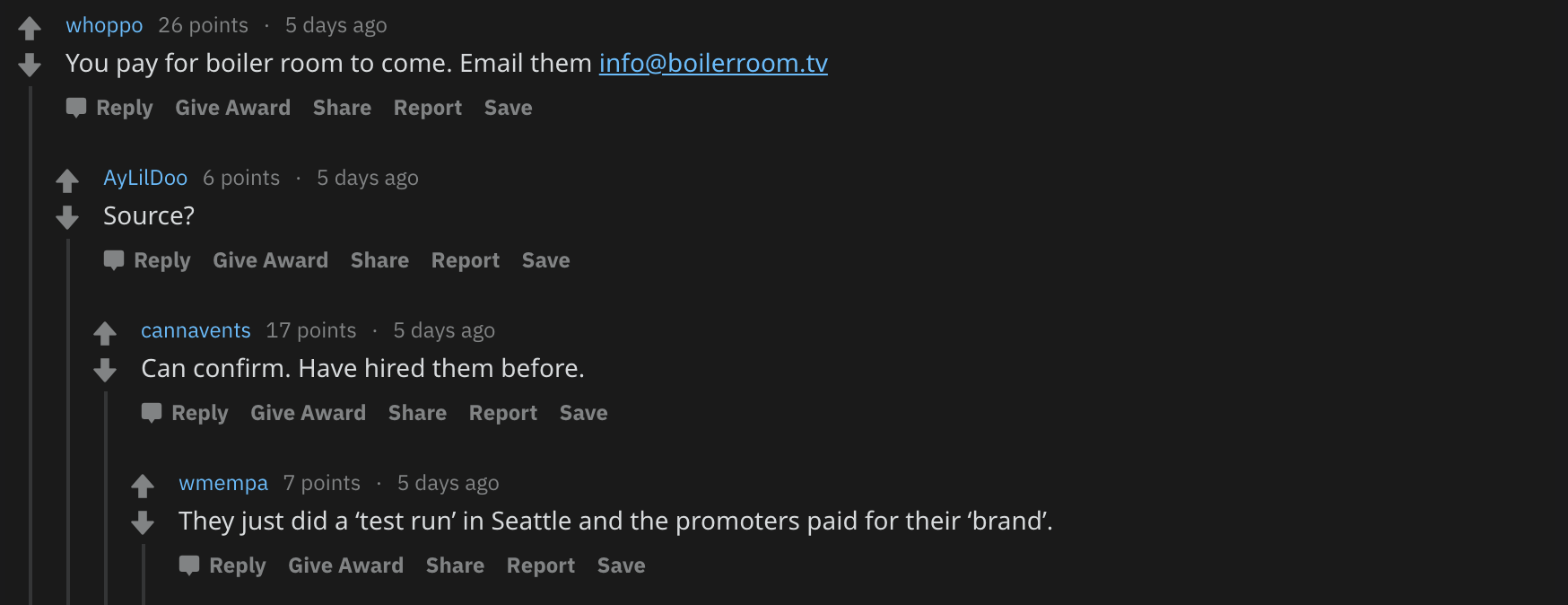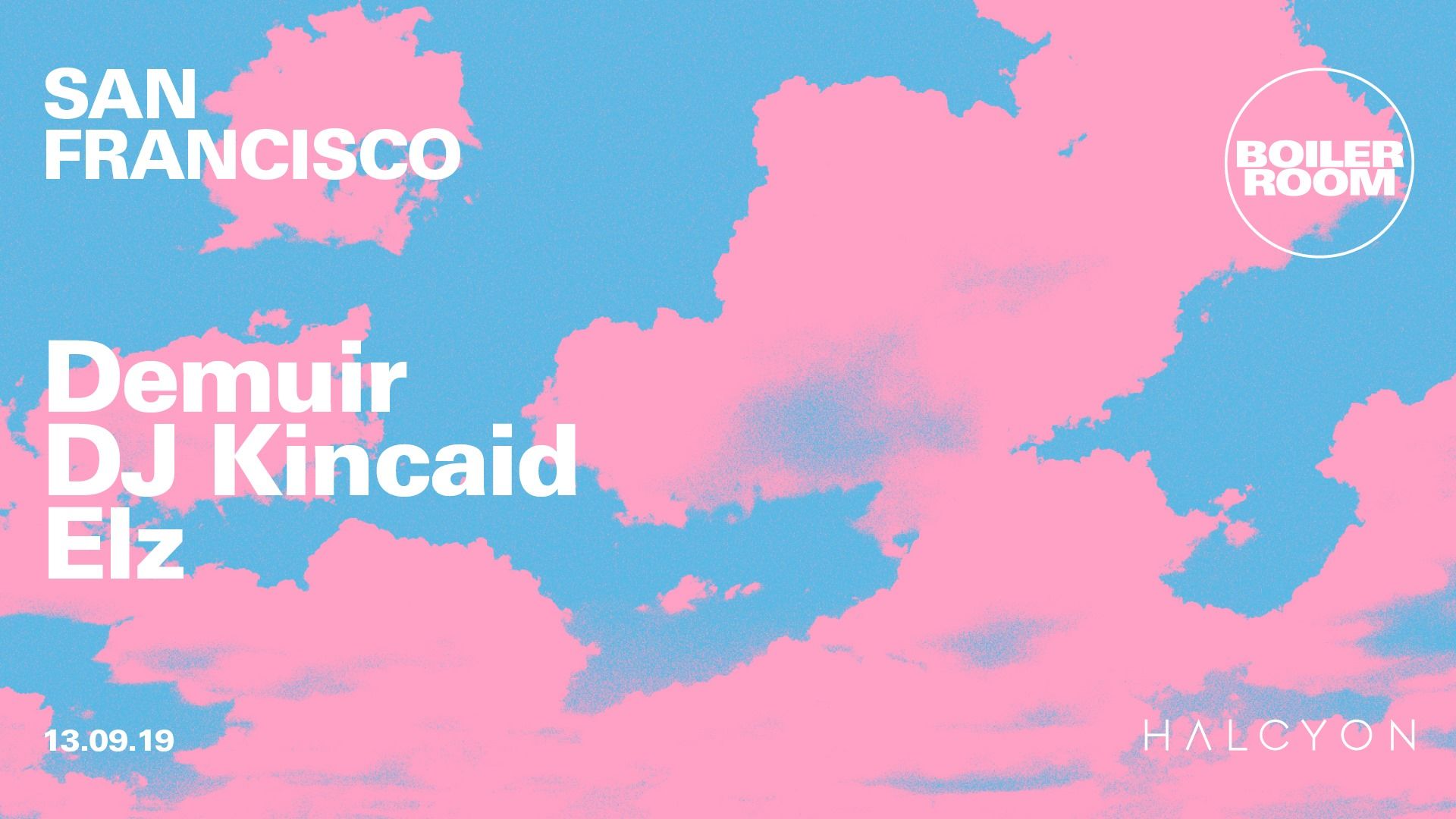What happens when you have a highly recognizable brand and you want to monetize it more? This article spotlights an instance of party branding that might have gone too far (we’d love to hear your thoughts in the comments).
There are new Boiler Room-branded parties, without any associated livestream broadcast, that local clubs and promoters pay for. Keep reading to learn more.
Over the years, who hasn’t enjoyed a great Boiler Room live stream? There are great mixes, incredibly clever artists, hilarious people watching. Their billions of minutes of streamed content have built a common shared experience within the electronic music scene.
But as a small local promoter, what happens when a brand asks you to pay them for their name, instead of the other way around?
Expansion into Party Licensing in 2019
When the first drafts at this article were written, it was late June. At the time, Pittsburgh promoter Aaron Clark shared this email from a Boiler Room staff member:
So, Boiler Room is now reaching out to underground promoters, offering to brand our parties as Boiler Room for a…
Posted by Aaron Clark on Tuesday, June 18, 2019
Adding insult to injury was how this pitch got directed at smaller promoters who achieved success. A comment on Aaron’s Facebook post clarified what made it especially weird:
“[…] this pitch was directed at a small party/venue in PGH that built up, against all odds, a thriving underground queer techno scene, though the efforts of parties like Honcho. Boiler Room had no interest in them before and, reverse engineering, I’d say their marketing team stumbled on them through either a regional push or seeing their billing at Glastonbury.
For a large enterprise like Boiler Room to want to suddenly be associated with a labor like this —and to want to actually take a cut for doing so—is pretty ballsy. Since queer techno crews are getting “got” right now, It seems like a cynical move from a start-up like company to try absorb cache, labor, and rep from something that’s a lot more organic and meaningful. Like, “thanks, we’ll take it from here.””
In a San Francisco music group, local promoter Dials shared a bit more historical context, having worked directly with Boiler Room for a number of shows:
“Music is more of a business now than ever and it has been taken over by evil, big corporations. FACT. Think about how in 2019 there are more shows up than ever but less independent promoters. It’s up to us as operators to create boundaries and try to provide quality events without compromising community. Which is hard, if not impossible.
I’ve done at least 10 events with Boiler Room and have never been paid… once. […] Recently, I did the US BOILER ROOM TOUR and did the show on my own dime. I worked on this fucking thing and put in over $8,000 of my own money on an upside down budget with no prospect of getting paid any profit AT ALL… […]
Do I think Boiler Room is perfect? No, but they are a company trying to scale and keep relevant now that streaming isn’t sacred and everyone is doing it. Do I think it’s important to support? Yeah, sure, but with boundaries and it should mean something – the model needs to include fair payment to artists and a platform for exposure – meaning real streaming and broadcast for these people to use.”
Promoters / Clubs Paying For Brand Recognition + Access
The reality is that Boiler Room’s business development team have realized that they can monetize without doing any additional work (ie: doing the actual livestream that they’re famous for). And it seems like promoters and clubs have bit the bait, with branded shows in Seattle, Toronto, San Francisco, a few around England, and more:

On the surface, monetizing in this way feels like smart business (cash!) in the short term, but in the long run BR runs a high risk of watering down their brand by building bad faith inside of the electronic music community.
Clubs Might See This Proposition As A Win

Here’s the thing: many less-discerning clubs love the idea of putting an international party brand on one of their party nights. In fact, Boiler Room’s name can sell out a club even without a lineup. That might be part of what’s wrong: people buying tickets to an event based on the “good name” of Boiler Room even if they’re not involved past putting their name on the party.
Two promoters speaking on behalf of Hanging Gardens, a club in Plymouth, UK, had this to say about hosting a night of the branded tour:
We were fortuitously given the opportunity of hosting a night of the UK Boiler Room tour just a few weeks ago. As a small independent nightclub in only it’s eighth month of operating, in what is typically quite a sleepy town with a night life scene that needs all the help it can get, I can categorically say from all of our team that not only was it a pleasure working with Boiler Room, but also one of the most successful nights in our short time of operating.
Reading through this and the quotes for the brand fee stated, I can absolutely say this is way off the mark and nowhere near accurate, certainly nowhere near what we paid. Although we did indeed pay a fee for using the Boiler Room brand, this proved to be nominal considering that tickets for this event sold out in 48 hours – without even announcing a line up. That was entirely due to the excitement of the brand being in Plymouth, with it also being stated from the start that it was a non broadcast event.
As a venue in a difficult city to promote this night ultimately became a platform to help cement ourselves here as a new venue and put us on the map amongst people who weren’t fully familiar with what we are doing. We also had a profitable night right across the board which only helps towards rent, business rates and the other costs behind the scenes in keeping a left of centre venue afloat. It also gave a wonderful chance for a dedicated group of young local DJs to play to a fantastic crowd, in what we all agree is one of the best atmospheres we have ever seen in our home city.”
How Does This Impact DJs?
DJs (and promoter DJs) are constantly looking for ways to reach new audiences – so being associated with a Boiler Room show seems like a great idea at first. But does it even mean anything anymore if anyone can slap the brand on a party for a fee?
And is it really worth it to contribute to the hyper-commodification of dance music culture? A great party should be able to succeed without throwing a brand name on the front of it – and that’s all what Boiler Room has become.
This starts to feel very similar to pay-to-play scam party models where DJs are forced to buy blocks of tickets before the event and sell them personally. The core focus of an event is simply to sell as many tickets as possible. For many DJs, it’s much more fulfilling to be a part of an event that champions other ideals beyond the bottom line. For instance, it’s great to see parties that:
- promote smaller, lesser-known acts
- build connections between attendees, artists, promoters
- promote diverse and under-represented artists
- provide beautiful, healthy, safe spaces to experience music in
Boiler Room can and has done the above things – but when they start shopping around their brand as an asset, it means that they’re putting money first and likely have no connection to anything to do with the local culture, artists, or party vibe.
It feels apt to close this article with this quote from then-Boiler Room music editor Gabriel Szatan in the Guardian, after their 5th anniversary party in 2015.
“Within the music world, Boiler Room is Uber,” he writes. “Rapid expansion, considerable disruption, and no small amount of backlash generated.”
What about Cercle? It’s hard to talk about Boiler Room and not mention Cercle, the big “competition” in the live streamed music performance space. In comparison, Cercle is creating art out of DJ and musician performances. They’re completely blowing Boiler Room out of the water when it comes to production value, entertainment, venues, creativity.
It would be amazing to see Boiler Room stepping up to the challenge and using their brand’s power to create powerful experiences instead of branding local parties without contributing in some way to the quality of the experience.





